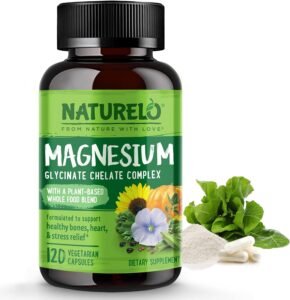Have you ever wondered if magnesium could be the key to promoting luscious, healthy hair growth? In the realm of health and wellness, magnesium often gets accolades for its role in muscle relaxation, improving sleep, and even easing anxiety, but its potential benefits for hair health are less frequently discussed.
Understanding Hair Growth
To appreciate how magnesium might impact your hair, it’s useful first to understand the basic mechanics of hair growth. Your hair grows in cycles, consisting of the anagen (growth) phase, catagen (transitional) phase, and telogen (resting) phase. Each hair follicle independently cycles through these phases, which are influenced by genetics, hormones, and nutritional factors.
The Hair Growth Cycle
You might be curious how exactly these phases work. Here’s a straightforward breakdown:
| Phase | Duration | Characteristics |
|---|---|---|
| Anagen | 2-7 years | Active growth, about 1 cm per month |
| Catagen | 2-3 weeks | Transition phase, growth stops |
| Telogen | 3-4 months | Resting phase, hair sheds at end |
The majority of your scalp hair (about 85-90%) is in the anagen phase at any given time, while a smaller percentage is in the catagen or telogen phases.
How Nutrition Affects Hair Growth
Your diet has a direct impact on the health of your hair. Nutrients like vitamins A, C, D, E, zinc, and iron all play crucial roles in maintaining healthy hair. But what about magnesium? Could this mineral also contribute to improving your hair growth?
The Nutritional Role of Magnesium
Magnesium is vital for over 300 biochemical reactions in your body, including energy production, DNA synthesis, and nervous system regulation. It is found in nuts, seeds, leafy greens, and whole grains. Despite its critical role, many people do not get enough magnesium through their diet, potentially impacting various physiological functions, including hair growth.

Magnesium’s Mechanism of Action
For you to understand how magnesium might help with hair growth, let’s explore how this mineral works in your body.
Magnesium and Protein Synthesis
Protein synthesis is essential for hair growth because hair is primarily composed of a protein called keratin. Magnesium plays a key role in protein synthesis, which could mean that adequate levels of this mineral are necessary for the production of keratin.
Magnesium and Circulation
Magnesium also helps to improve blood circulation. Better circulation means that nutrients and oxygen can more effectively reach your hair follicles, promoting healthy hair growth.
Magnesium and Stress Reduction
Stress can be a major factor in hair loss. Magnesium has been shown to help reduce cortisol levels and manage stress, which could prevent stress-related hair loss conditions like telogen effluvium.
What Does Science Say?
The theory is compelling, but what does research say about the relationship between magnesium and hair growth?
Studies on Magnesium and Hair Growth
While direct studies on magnesium’s effect on hair growth are limited, some research suggests that magnesium deficiency can lead to hair issues. A deficiency in magnesium may result in poor hair follicle health, leading to hair thinning and loss.
Related Nutritional Studies
Some broader studies on hair and nutrition have included magnesium among other vitamins and minerals. These studies often find that a well-rounded diet rich in essential nutrients supports healthy hair growth.

Practical Ways to Incorporate Magnesium
If you’re considering boosting your magnesium intake to improve your hair growth, you have several options to consider.
Magnesium-Rich Foods
Incorporate magnesium-rich foods into your diet. Here’s a handy table to guide you:
| Food | Magnesium Content (mg per serving) |
|---|---|
| Pumpkin seeds | 156 |
| Spinach (cooked) | 157 |
| Almonds | 80 |
| Black beans | 60 |
| Dark chocolate (70-85%) | 50 |
| Avocado | 58 |
| Salmon | 26 |
Magnesium Supplements
Supplements are an option if you find it challenging to get enough magnesium from food alone. Always consult with a healthcare provider before starting any new supplement regimen to ensure it’s safe and appropriate for you.
Topical Magnesium
You might also be interested in topical magnesium oils or creams, which can be applied directly to your scalp. This method promotes absorption through the skin, potentially delivering magnesium directly to your hair follicles.
Other Factors Affecting Hair Health
While increasing your magnesium intake can potentially help, remember that other factors also impact hair health.
Balanced Diet
Ensure you’re consuming a balanced diet rich in vitamins and minerals that support hair growth, including iron, zinc, and vitamins A, C, D, and E.
Hydration
Hydration is often overlooked but crucial for maintaining the health and integrity of your hair. Make sure you’re drinking plenty of water each day.
Hair Care Routine
Using the right hair care products, avoiding excessive heat styles, and frequently trimming your hair can also contribute to maintaining healthy hair.

Myths and Misconceptions
It’s easy to get lost in the array of claims surrounding hair growth solutions, so let’s address some common myths and misconceptions.
Myth: More Magnesium is Always Better
Taking excessive amounts of magnesium won’t necessarily fast-track your hair growth and can actually lead to side effects like diarrhea and nausea. Moderation is key.
Myth: Magnesium Alone is a Cure-All
While magnesium can be beneficial, it’s unrealistic to expect it to solve all your hair problems by itself. A holistic approach to hair health is always more effective.
Misconception: Magnesium is Hard to Get
Some believe that magnesium is difficult to obtain through diet. However, by eating a varied diet that includes nuts, seeds, and leafy greens, you can easily meet your daily requirements.
Real-Life Testimonials
Hearing about others’ experiences can be helpful when you’re exploring new health strategies.
Testimonial 1: Sarah’s Journey
“I started adding more magnesium-rich foods into my diet, and within a couple of months, I noticed my hair looking shinier and feeling thicker. I can’t say it was just the magnesium, but I am pleased with the results.”
Testimonial 2: Mike’s Experience
“I struggled with stress-related hair loss for years. Including magnesium supplements helped me manage my stress better, and over time, I noticed less hair fall.”
Frequently Asked Questions
You might still have some questions about how magnesium affects hair growth. Let’s address them:
How Much Magnesium Do I Need?
The recommended dietary allowance (RDA) for magnesium varies by age and gender. For adult men, it’s about 400-420 mg per day, and for adult women, it’s about 310-320 mg per day.
Can I Overdose on Magnesium?
While it’s rare to overdose on magnesium from food alone, excessive intake from supplements can cause gastrointestinal issues. Always stick to the recommended dosage unless advised otherwise by your healthcare provider.
How Long Before I See Results?
Hair growth is a slow process, so be patient. It generally takes a few months to notice changes in hair health after making dietary adjustments or starting a new supplement regimen.
Conclusion
So, can magnesium help hair growth? While it’s not a silver bullet, magnesium does play a crucial role in various bodily functions that can contribute to healthier hair. Incorporating magnesium-rich foods into your diet, considering supplements if necessary, and paying attention to overall hair care practices can all help you achieve luscious, healthy hair. With a balanced approach, you’ll be well on your way to unlocking your hair’s full potential.




